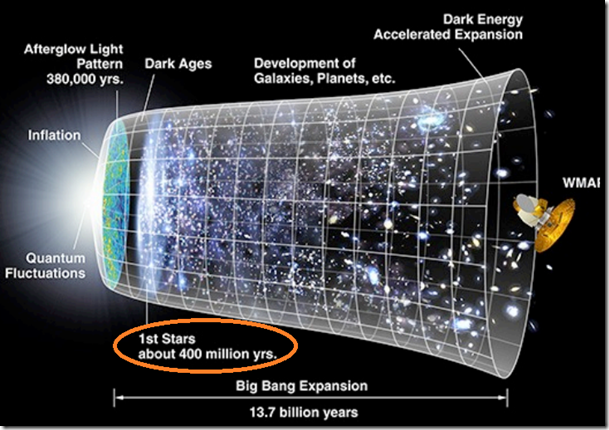Previous Puzzle: Big Bang Puzzle Piece I: Seeing Red
Oldest Galaxies and Stars
Based on a poster of the Big Bang, the first stars should have formed about 1 billion years after the big bang:

Yet, recently we keep finding more and more completely formed galaxies, that are older than that: for instance 7 from a period around 380 million years after the big bang. So that is much earlier than predicted. Also, this means that the galaxies only had a very short time to form. It takes over 200 million years just for one rotation of the milky way galaxy, for instance. Yet galaxy formation requires many rotations. There is even one galaxy that was found a mere 200 million years after the Big Bang. That means it didn’t even have time for one complete rotation… ?
Even in later posters, where they move the star formation to an earlier time, the first stars are supposed to have formed 400 million years after the Big Bang, and galaxies much later than that:

Based on computer simulations, it takes more than 1 billion years for a complete spiral galaxy to form: http://apod.nasa.gov/apod/ap120717.html (in this one, several billion years). Other simulations also indicate that it takes at least 1-2 billion years for a galaxy to form: http://www.theguardian.com/science/video/2013/may/28/galaxy-formation-universe-video
The obvious question is: is the universe older than we think ? But instead of asking this question, scientists are changing the models of galaxy formation. They don’t even mention the possibility, that just maybe, the universe is older. They simply assume that we know that the Big Bang is true, so everything else has to be changed to fit this model. To me, this sounds more like a religious dogma than true science…
Next Puzzle: Big Bang Puzzle Piece 3: Static Universe?
Links
Oldest galaxies and stars:
- 200 million years after big bang:
http://www.extremetech.com/extreme/176497-weve-found-the-oldest-star-in-the-known-universe-and-its-right-on-our-galactic-doorstep
http://news.softpedia.com/news/First-Galaxies-Formed-200-Million-Years-After-Big-Bang-195083.shtml - 380 million years after big bang:
http://news.nationalgeographic.com/news/2012/121214-hubble-oldest-galaxy-discovered-space-science/
http://www.scientificamerican.com/article/early-universe-galaxy-hst/ - 420 million years after big bang:
http://rt.com/news/oldest-galaxy-discovered-universe-922/ - 500 million years after big bang: http://news.nationalgeographic.com/news/2014/01/140107-hubble-oldest-frontier-science-space-astronomy/
- 650 million years after big bang:
http://www.upi.com/Science_News/2014/02/20/New-Hubble-Space-Telescope-images-showcase-universes-oldest-galaxy/4671392934751/ - 700 million years after big bang:
http://www.theguardian.com/science/2013/oct/23/most-distant-galaxy-star-factory
http://arstechnica.com/science/2013/10/oldest-galaxy-yet-seen-forming-stars-100-times-faster-than-milky-way/
Galaxy Formation/Simulations:
- http://www.universetoday.com/23870/the-milky-ways-rotation/
- http://arxiv.org/abs/1103.6030
- http://apod.nasa.gov/apod/ap120717.html
- http://www.theguardian.com/science/video/2013/may/28/galaxy-formation-universe-video
- http://www.plasma-universe.com/Galaxy_formation
Big Bang Problems:
- http://csep10.phys.utk.edu/astr162/lect/cosmology/bbproblems.html
- http://science.howstuffworks.com/dictionary/astronomy-terms/big-bang-theory7.htm
- http://www.spaceandmotion.com/Cosmology-Big-Bang-Theory.htm
- http://metaresearch.org/cosmology/BB-top-30.asp
- http://www.marmet.org/cosmology/fallofbigbang/index.html
- http://www.dailygalaxy.com/my_weblog/2013/11/the-largest-discovered-structure-in-the-universe-contradicts-big-bang-theory-cosmology-weekend-featu.html
- http://www.rense.com/general63/bbang.htm
- http://voices.yahoo.com/old-galaxies-young-universe-contradict-big-8744047.html
- http://cosmologyscience.com/cosblog/observation-of-two-early-mature-galaxies-rare-objects-or-is-big-bang-model-inaccurate/
- http://cosmologyscience.com/cosblog/spiral-galaxy-bx442-supports-hubbles-belief-redshift-does-not-mean-expansion/
- http://rense.com/general53/bbng.htm
- http://www.spaceandmotion.com/cosmology/halton-arp-seeing-red-errors-big-bang.htm
- http://www.haltonarp.com/articles/is_physics_changing
- http://electric-cosmos.org/arp.htm
- http://www.astronomynotes.com/cosmolgy/s12.htm
